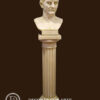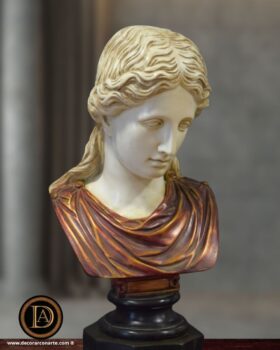Description
Bust of Cicero, reproduction of a sculpture crafted in molded marble (marble powder bonded with resins). Aging patinas are applied with natural earth.
High-quality reproduction of classical art, ideal for decoration or as a gift.
Measurements: Height: 52 cm. Width: 35 cm. Depth: 26 cm. Base: 19 x 19 cm.
Approximate weight: 10 kg.
Bust of Cicero, reproduction made in a reduced size from the original sculpture representing Cicero, the well-known politician, writer, and philosopher from the end of the ancient Roman Republic. This bust can be found in the Prado and plays an important role in identifying Cicero’s portrait, as the sculpture bears the inscription of the name of the famous Roman orator (106-43 BC) on the rectangular tablet of the pedestal, where the abbreviated inscription appears: “M.CICERO AN. LXIIII”.
Marcus Tullius Cicero (106 BC – 43 BC) was a prominent Roman politician and philosopher who left a lasting impact on the history of Rome and Western political thought. Famous for his eloquence, Cicero became one of the greatest orators of antiquity. He had a significant political career, including positions such as consul and senator, and defended the Roman Republic against internal threats, such as Catiline’s conspiracy. As a philosopher of the Stoic school, he advocated for the practice of virtue and ethics in one’s own life.
Cicero’s life was marked by intrigues and political persecution, from his confrontation with Julius Caesar to his opposition to the policies of Mark Antony, which led to his subsequent exile and execution. Cicero’s legacy endures today as a symbol of the defense of freedom and justice in ancient Rome.
“It is necessary that the spirit be free from all disturbance of ambition and fear, as well as from sadness, immoderate joy and anger, in order to enjoy the serene tranquillity that brings with it the constancy and feeling of our dignity.” (Cicero)
“It is perfectly licit and natural for each one to procure for himself, before others, the means necessary for life; what nature does not tolerate is that we increase our own substance, our wealth and our power with the misfortunes of others. (Cicero)
Read more about the Stoic philosophers on our blog: Stoic Philosophers, a model of Strength and Joy


























Reviews
There are no reviews yet.